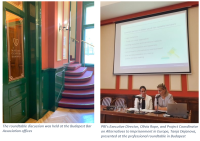“The system is just not ready” – Promoting alternatives to imprisonment in Hungary

- Is strict penal policy good?
- What can the Hungarian criminal justice system learn from other countries’ use of non-custodial sanctions?
- Would the introduction of sentencing guidelines change practice and reduce discrimination?
- Why are available non-custodial sanctions not used more?
- How can we address common barriers to better use of community-based sanctions?
- What can we do in the face of apparent public expectation that people convicted of criminal offences go to prison?
These and other questions were explored by varied Hungarian criminal justice actors during a professional roundtable discussion on the possibilities and challenges in using and implementing non-custodial sanctions and measures in the country. The discussion, organized by PRI and the Hungarian Helsinki Committee within the framework of our ongoing EU-funded project, PRI Alt Eur: Promoting non-discriminatory alternatives to imprisonment across Europe [1], was held on 13 July 2022 at the Hungarian Bar Association offices in Budapest.

A lively discussion took place between criminal justice professionals who expressed appreciation for such a rare opportunity to come together and share questions, insights and possible solutions to systemic issues. The global and local context of rising prison populations and an analysis of existing national legislation by the Hungarian Helsinki Committee, alongside recommendations for reform, underpinned the conversation.
PRI presented key international standards as well as innovative and good practice examples of sentencing and use of non-custodial measures from other European countries and beyond, underscoring the importance of individualised, rehabilitative and collaborative approaches to human rights based and effective sentencing and sentence implementation.

Slides from PRI’s presentation on good practices in sentencing and use of non-custodial sanctions and measures
While the markedly punitive national context presents noted challenges to reducing imprisonment through wider use of community-based sanctions, the roundtable made it clear that learning from varied stakeholder groups and other systems is crucial to realising progress toward criminal justice that is fair and does not disproportionately punish or harm certain people or groups.
Aiming to promote non-custodial sanctions among local criminal justice actors to reduce overreliance on prisons, the roundtable offered an opportunity for a rich professional exchange. Building on this stakeholder engagement, further capacity building, research and advocacy activities will take place in the coming months in Hungary, Portugal (the project’s other focus country), and internationally.

[1] Coordinated by Penal Reform International, the two-year project is funded by the European Union’s Justice Programme (2014-2020), and is implemented by our consortium partners the Hungarian Helsinki Committee and the Legal Research Institute of the Faculty of Law of the University of Coimbra.